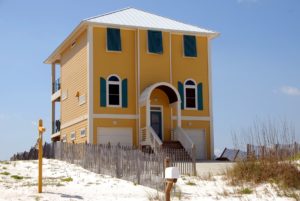 In almost every market in the country, the housing bust is over. Residential properties waylaid by the recession are back to their original values and higher, thanks to a strong economy and low numbers of homes on the market. But one sector of properties that still haven't made it back is vacation home markets. According to a new report from Zillow [1], markets with the highest concentrations of vacation homes saw a more exaggerated bubble-and-bust cycle than the rest of the housing market when the crisis hit.
In almost every market in the country, the housing bust is over. Residential properties waylaid by the recession are back to their original values and higher, thanks to a strong economy and low numbers of homes on the market. But one sector of properties that still haven't made it back is vacation home markets. According to a new report from Zillow [1], markets with the highest concentrations of vacation homes saw a more exaggerated bubble-and-bust cycle than the rest of the housing market when the crisis hit.
During the housing boom, Zillow reported [2], home values in vacation markets—areas with high concentrations of vacation homes—climbed 117 percent between 2000 and 2006. Even in lower-density vacation areas, values were up 83 percent during the boom.
At the peak of the recession, high-density vacation markets saw their properties lose 35 percent of their value; in low-density vacation spots, it was 26 percent.
Nearly a decade later, markets with the highest densities of vacation homes remain 9 percent below their pre-crisis peak value, the report stated. By contrast, areas, where vacation homes are least common, are 14 percent above their peak.
“Vacation home markets have lagged the rest of the country during the economic recovery, despite an exaggerated boom and bust a decade ago,” said Aaron Terrazas, Senior Economist, Zillow. “As the economy improves and more Americans feel secure in their personal finances and primary residences, it is possible that more will look to buy a vacation home.”
Among the worst hit when the bottom fell out was Hilton Head Island, where 54 percent of homes are vacation homes, Zillow reported. During the boom, the typical home gained 95 percent in value between 2000 and 2006, then lost 41 percent in the crash. In comparison, nearby Beaufort County gained a comparatively moderate 67 percent in value, then fell 36 percent.
“Since 2010, home value appreciation in vacation markets has been slower than the rest of the market every year except 2012,” Zillow reported. “Home values grew 0.7 percentage points less in vacation markets in 2017 than they did in the rest of the country.”
“The good news is that there are still bargains to be found in many vacation communities, but recent tax changes will eat into the tax benefits of second-home ownership,” Terrazas said. “Beyond financial considerations, Americans are increasingly conscious of the environmental risks common in many vacation communities, including those from rising sea levels and storm surges, hurricanes, and wildfires.”
According to the report, the Southern and Western regions have the biggest recoveries to make. Vacation homes are 21 and 17 percent below their pre-crisis values, respectively in these regions.
The Midwest is the only region where vacation home markets have recovered better than areas where vacation homes are less common, the report found. Vacation market values there are 9 percent above bubble prices.